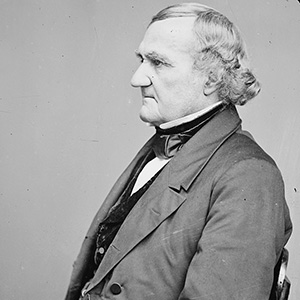John Catron (1837-1865) was a soldier and justice on the Tennessee Supreme Court of Error and Appeals before being appointed by Andrew Jackson to serve as an Associate Justice to the United States Supreme Court.
Early Life
Not much is known about John Catron’s early life. Catron was born in 1786 in Pennsylvania. Throughout his life he often changed residences, having lived in Virginia and Kentucky before moving to Tennessee. After moving to Tennessee, he served under Andrew Jackson as a soldier in the 1813-1814 Creek war. As a soldier he fought alongside Jackson in the battles against the Red Stick Creeks, a faction of Creek Indians opposing America’s takeover of their land.
Early Career
After serving as a soldier, John Catron was admitted to the Tennessee bar in 1815. He then moved to Nashville where he primarily practiced as a land law litigator from 1818-1824. Thereafter, Catron began his prominent career as a judge on the Tennessee Supreme Court of Error and Appeals. His most notable accomplishments during this time include becoming the court’s first chief justice in 1831 and authoring Love v. Love in 1828, where the court held that holding legal title to land is unnecessary when the owner has resided on the land for a continuous seven-year period. Despite these accomplishments, Catron’s career as a Tennessee judge came to an abrupt end when Tennessee’s legislature abolished the Supreme Court of Error and Appeals in 1835. This decision was sparked by Catron assisting Martin Van Buren in his presidential election, which angered many of the state’s legislators. This, however, did not mark the end of Catron’s judicial career, as he was appointed to the United States Supreme Court in 1837 by Andrew Jackson.
Supreme Court
John Catron was known to be a slave-owner throughout his entire life. His views regarding slavery had a clear impact on his decision-making ability while serving as a Supreme Court justice, as he authored a concurring opinion in the infamous Dredd Scott v. Sanford decision. In his concurrence, Catron agreed with the majority that Congress lacked the power to interfere with state decisions regarding slavery.
In addition to his strong views regarding slavery, Catron deeply opposed secession from the Union. This opposition stemmed from his belief that the American Union should always be preserved. Therefore, Catron voiced strong opposition to Tennessee’s desire to secede from the Union. Catron’s opposition to secession had consequences, as he eventually fled from Tennessee because remaining there when the state favored secession put his life in danger.
Death
John Catron’s tenure as a Supreme Court justice came to end with his death on May 30th, 1865.








